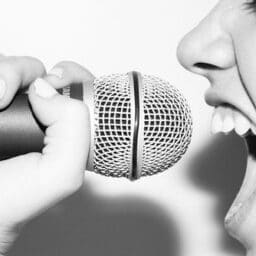
Go ahead and belt that show tune in the shower — it’s for your health! It’s long been known that singing can reduce stress and increase mental alertness, but your melodies may also improve the way you hear and understand conversations in noisy places, according to recent research.
Deciphering speech in noisy situations can be hard for older adults. Hearing aids can only help so much, because separating speech from noise doesn’t happen in our ears as much as it does in our brains. As people age, something declines along the pathway between the inner ear and the brain’s auditory cortex. Although hearing aids are becoming increasingly better at suppressing extra noise, they can’t completely correct the problem of aging auditory systems.
But some people have less of a problem as they age. Older musicians do better than non-musicians at distinguishing speech from noise, even when their overall hearing is the same — and researchers wanted to know why. So some scientists invited older adults to join a choir (no musical experience or talent required), and tested whether the musical training changed how their brains processed speech in noisy environments. Each session lasts ten weeks, with one two-hour rehearsal each week.
“Singing is sort of like brain boot camp. You’re sort of whipping your neurons into shape,” said Ella Dubinsky, a graduate student in the lab where the choir experiment was conducted. “We wanted to see how short-term could we make the musical training. How quickly can we see these improvements?” she said.
In addition to the choir participants, the researchers followed two other control groups for comparison. One simply listened to music, and the other had no musical intervention. The result? The choir group’s hearing improved after singing training. The other two groups showed no improvement.
But don’t move to Broadway and addition for Hamilton yet. Besides singing, there are other ways that you can improve your hearing at any age.
Practice Focusing on and Locating Sounds.
Hearing exercises can help you hone in on where sounds are coming from and who or what is making the sounds. Create a noisy (but comfortable) environment. Have someone move around the room while reading sentences from a book or newspaper. Close your eyes, repeat the sentence back to them, and try to locate from where he or she is reading the sentence.
Practice recognizing various types of sound.
Close your eyes and listen to all the different sounds in your environment. One by one, try to decipher individual sounds that you hear, both near and far away. The more you practice, the more sounds you will learn to recognize.
Consider downloading software apps designed to improve hearing.
Examples include AB CLIX (based on identifying differences between words), Forbrain (based on recognizing pertinent sounds in voices), and Category Carousel (based on associating sounds with images).
Exercise
Besides giving you strength, balance, and flexibility, did you know exercises like yoga, walking, and stretching can help with your hearing? Exercise increases circulation in your ear and brain, and good circulation is important for healthy nerve function. If your doctor agrees you’re healthy enough, chances are good that exercise will help you feel better as well as hear better, too.